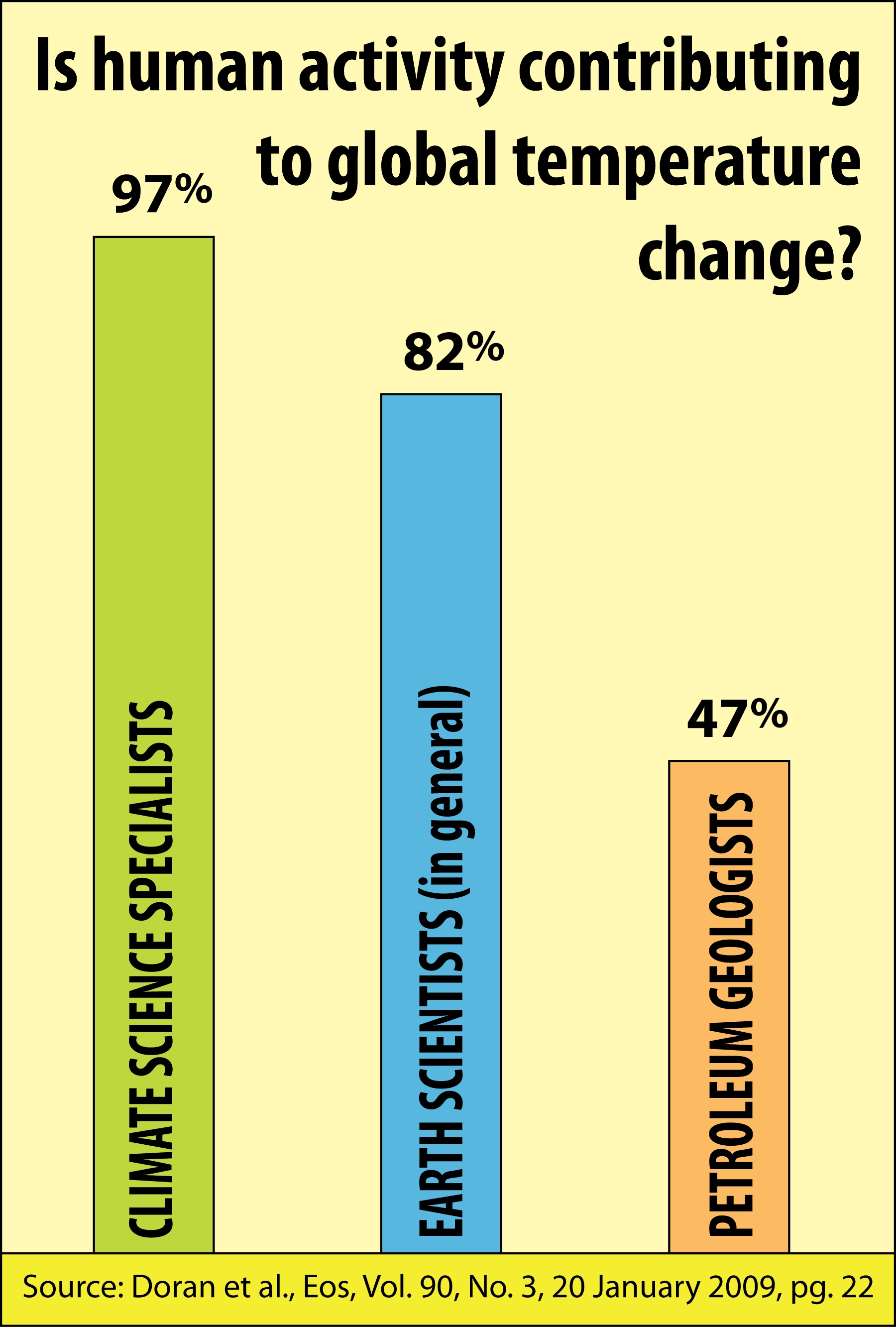19 April 2010
A message to science educators and students about global climate change
 Guest post by John C. Ayers, Professor at Vanderbilt University.
Guest post by John C. Ayers, Professor at Vanderbilt University.
A recent poll of earth scientists found that 97 percent of actively publishing climate scientists agree that data clearly demonstrate the earth is warming and that human activity is contributing to rising temperatures (EOS v. 90 Number 3, p. 22 — those who don’t have access to Eos, see this CNN story). In contrast, the same poll found that only 82 percent of earth scientists agree that human activity is contributing to climate change. Many of the 18 percent who disagreed are undoubtedly science educators. This poll and my own experience suggest that a significant percentage of university and high school science educators who are not climatologists remain skeptical about human-induced climate change because they haven’t taken an in-depth, unbiased look at the data. Then they pass their skepticism on to their students.
What these science educators need to realize is that they are teaching their students to be skeptical not about one scientific theory, but the entire scientific process. If science educators don’t accept the overwhelming consensus of scientific experts, why should their students or the public? My concern isn’t so much whether students learn and accept the scientific consensus on global warming; it is that students will conclude that science isn’t a legitimate source of knowledge, and shouldn’t play a role in public policy decisions. Science educators who express opinions rather than demonstrate facts undermine the scientific process. The best approach is for educators to present the facts and let students draw their own conclusions.
Now, climate contrarians are allying with creationists to keep teaching of global climate change and evolution out of public schools (see “Darwin Foes Add Warming to Targets”, Kaufman, March 3, 2010). For over a century, creationists and their predecessors have fought earth scientists about the age of the earth, biologists about evolution, and astronomers about the age of the universe. Expert scientists in these fields need support from non-expert scientists. All members of the scientific community must learn the scientific evidence relevant to each of these battles and avoid undercutting science by voicing uninformed opinions.
Students of science: Don’t believe anyone who states opinions about scientific issues without presenting supporting facts. If your teacher or political representative makes an unsubstantiated challenge to the consensus scientific view on global climate change, evolution, or any other topic, demand the evidence they base their opinions on. If the response rests on politics, religion, or something else that is not science, call them on it. On climate change, ask why they think they know better than the 97 percent of climatologists. If they claim that scientific experts in the field are unreliable or have all committed fraud, ask them why you should trust any scientific authority. All scientific claims need to be tested. Students can contribute to scientific progress by testing claims of science educators, or even better, by persuading educators to test their own claims.
[A previous version of this blog post was published in Ayers’ Sustainability Blog]
– John C. Ayers, Vanderbilt University










 The Plainspoken Scientist is the science communication blog of AGU’s Sharing Science program. With this blog, we wish to showcase creative and effective science communication via multiple mediums and modes.
The Plainspoken Scientist is the science communication blog of AGU’s Sharing Science program. With this blog, we wish to showcase creative and effective science communication via multiple mediums and modes.
It would appear that your own bias is prevalent here too. The CNN article cites the fact that meteorologists are also part of the 47% disagreeing. Science educators who woudl ignore the opposing opinion should also be called into question.
Your view is very clear here. You think anybody that disagrees with your opinion should be questioned and that everyone should align with the consensus becasue it is the majority. Questioning the science is a good exercise and what should indeed be taught.
Buckley, is questioning the science for the sake of the exercise a good enough reason on its own?
I can’t help noticing that the same right-wing media who keep denying climate change are the same ones salivating that the northwest passage may soon be open year-round, making shipping shorter and cheaper.
Actually, 64% of meteorologists agree, if you read the source article carefully.
Buckley, Meteorologists report weather; they do not study climate. You can’t understand climate change if you don’t appreciate the difference.
Here’s a great story on the undue credence the public gives to TV meteorologists on the topic of climate change.
http://www.cjr.org/cover_story/hot_air.php
[…] by researchers at Stanford suggests otherwise. In any case, the science behind climate change has not changed (also see America’s Climate Choices), but there certainly remains a problem in communicating […]